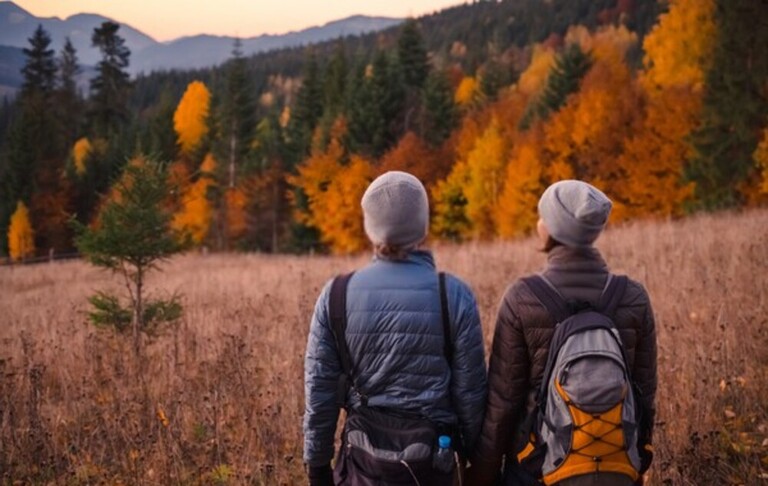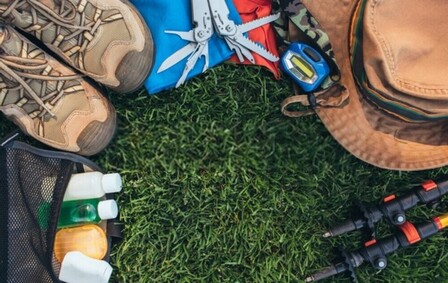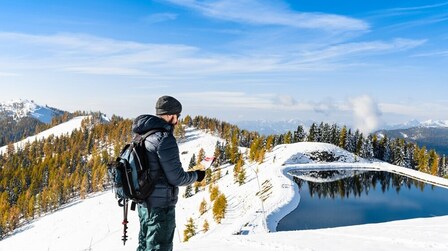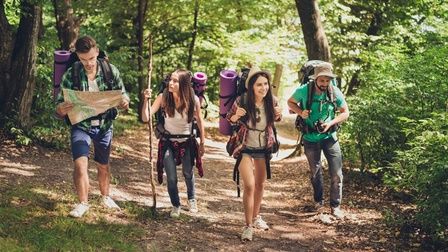Seeing a snake is something that probably happens when you’re hiking in the woods. By educating yourself on how to protect yourself against such cases, your safety is increased and your outdoor experience will be better.
Here is how to protect yourself against snakes when hiking. Take a look!
Prevent a snake encounter
Hike When It’s The Coolest

Since snakes are cold-blooded animals, they love warm weather and will become the most active during late spring to early autumn, especially during the summer both in daylight and at night.
On the contrary, the cooler the weather, the less active they are. They will become sluggish and lethargic at the temperature of 60 degrees F.
From that point, the best time in the year for hiking with no snake encounter is from mid-autumn to early spring.
Avoid Hiking Through Those Places Snakes Would Go/Hide
Rocky streams and wooded areas are the two most common places where snakes will go at night time during warm seasons.
Besides, during brumation, snakes tend to find a warm spot and burrow in there, such as deep caverns, caves, tree stumps.

Different from hibernation, snakes enter a state called brumation during cool seasons. They will sleep more but still wake up for food and water. Because of being less active, they use less energy, which makes the period of time between feedings longer.
Avoid Night Hiking

While during daylight, everything is visual so that you can easily avoid a snake encounter, the darkness of nights makes it hard to see where you will step on, increasing the opportunities of snake encounters.
Signs To Know That You Hike Close To Snakes’ Area
Although snakes are excellent at hiding and rarely leave evidence of their existence, there are still some signs to let you know you’re close to their area:
- Shed skin, usually found on tree branches, in leaf litter, log piles, and rock beds

- Snake droppings
- Strange odor
- Slither tracks in a crawlspace or dusty area
Use Those Smells That Snakes Hate
Snakes really dislike scents like lime, garlic, onions, cloves, cinnamon, and smoke. You can use sprays or oils containing these scents to avoid encountering them while on a hike.
Pay Attention To Warning Signs

As stated, snakes enter brumation during cool months.
But they still go out for food and water sometimes or if the temperature is too low, they might move on/off trails to keep their blood flow moving and their body warmer. The reason is open areas like trails usually expose more sunlight than shady spots.


Besides, look carefully before you step on obstacles like fallen logs and rocks because these might be a great basking place for snakes.
And, staying on the path rather than checking out an epic waterfall, taking a shortcut through the high brush, or braving climbing the big rocks since these areas usually have mossy, damp areas with thick grass – which are also the most favorite spots of snakes.
Extra Snake Safety Tips
Hide Your Ankles
If you accidentally step in between a snake and its meal, there are chances you’ll get a bite from them. One of the most popular areas they will bite is your ankles.

In those bad cases, wearing a pair of ultra-thick, high-ankle socks or long-running tights does help to save these body parts from a snakebite. But make sure these items are breathable and moisture-wicking as well.
Hike With Another Partner
Two pairs of eyes observing the surroundings are always better than one. Hiking with a partner increases the security level of your trip, and if one of you is unfortunately bitten or injured, the other will be there to help.

Learn About Snakes
“People who see through life and death will meet most success”, they say.
By learning about types of snakes, how to distinguish between them, and the best way to deal with their bites, you’ll get the right plan to avoid or handle in any case.

The best thing is you will feel less scared when hiking or be frightened once encountering one during the path.
What To Do If You Encounter A Snake
Try Not To Panic
Most people who see a snake for the first time without learning anything about it beforehand might be scared and panic. In such moments, you might do something stupid that you mostly feel regret later.
That’s why we advise you to learn about types of snakes before hiking in the woods.

Look For Warning Signs That Snakes Show You

Writhing, coiling, rattling, huffing, and hissing are the most common warning signs that snakes make to show you that you stay too close to their area.
In such cases, you’ve got three choices:
- Run back the way you came
- Find a way around it
- Slowly step back from the snake if it’s just crossing the trail

Conclusion
That’s all for this article!
We hope that you’ve learned something good to protect yourself against snakes when hiking. If you want any extra pieces of information, don’t hesitate to let us know. Thanks a lot for reading and happy hiking!











